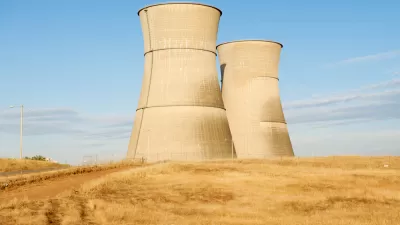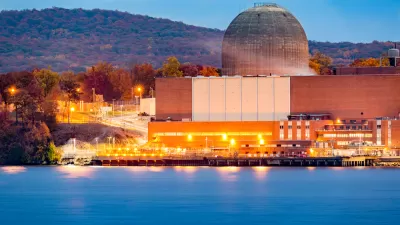Shutting down one form of clean energy with plans to replace it with another keeps us running in place, or worse, falling behind on decarbonization goals.

As California winds down production of nuclear energy at the Diablo Canyon plant, "[t]he California Public Utilities Commission (CPUC) voted on June 24th to approve a procurement package composed of 11.5 GW of clean energy resources that will come online by 2026." But Adam Stein argues that replacing the nuclear plant with other clean energy sources is tantamount to running in place–or worse. "In the approved procurement order the CPUC made its position clear that building new fossil fuels resources is the best option — they have just postponed it until after further analysis is completed to justify this position."
This, Stein says, "would not be necessary if the older and less efficient fossil-fueled generators were replaced with renewables instead of replacing a clean firm source like Diablo." According to Stein, "[n]one of the resources proposed to replace Diablo Canyon are as resilient to extreme weather — not even gas or geothermal. The once-through cooling system from the ocean is heat and drought resistant. The long fuel cycle lets the power plant ride out any storm without concern for fuel security."
Stein calls this replacement "treadmill decarbonization," writing that "[i]nstead of moving toward a cleaner and lower-carbon energy system, treadmill decarbonization just runs in place by swapping one clean energy source for another." This also hurts ratepayers: "Just for the closure of Diablo Canyon, ratepayers will have to shoulder $437 million in the form of higher electricity prices to support the local economy, community support programs, and more than 1,300 lost jobs. Instead of paying almost half a billion dollars to force clean energy off the grid, that investment could have gone to building more clean energy."
FULL STORY: Treadmill Decarbonization Doesn’t Help

Maui's Vacation Rental Debate Turns Ugly
Verbal attacks, misinformation campaigns and fistfights plague a high-stakes debate to convert thousands of vacation rentals into long-term housing.

Planetizen Federal Action Tracker
A weekly monitor of how Trump’s orders and actions are impacting planners and planning in America.

San Francisco Suspends Traffic Calming Amidst Record Deaths
Citing “a challenging fiscal landscape,” the city will cease the program on the heels of 42 traffic deaths, including 24 pedestrians.

Adaptive Reuse Will Create Housing in a Suburban Texas Strip Mall
A developer is reimagining a strip mall property as a mixed-use complex with housing and retail.

Study: Anti-Homelessness Laws Don’t Work
Research shows that punitive measures that criminalized unhoused people don’t help reduce homelessness.

In U.S., Urban Gondolas Face Uphill Battle
Cities in Latin America and Europe have embraced aerial transitways — AKA gondolas — as sustainable, convenient urban transport, especially in tricky geographies. American cities have yet to catch up.
Urban Design for Planners 1: Software Tools
This six-course series explores essential urban design concepts using open source software and equips planners with the tools they need to participate fully in the urban design process.
Planning for Universal Design
Learn the tools for implementing Universal Design in planning regulations.
Heyer Gruel & Associates PA
JM Goldson LLC
Custer County Colorado
City of Camden Redevelopment Agency
City of Astoria
Transportation Research & Education Center (TREC) at Portland State University
Jefferson Parish Government
Camden Redevelopment Agency
City of Claremont




























